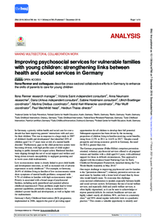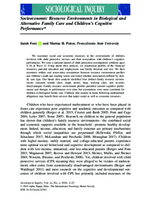Displaying 181 - 190 of 525
This research investigated the association between care placement and the presence of child mental health problems after controlling for children’s pre-care experiences. It also identified factors associated with mental health problems among children in care in the UK.
This article from BMJ describes cross-sectoral collaborative efforts in Germany to enhance the skills of parents to care for young children.
The authors of this article examined social and economic resources in the environments of children involved with child protective services and their associations with children's cognitive performance.
In this article, the author provides a synopsis of some current statistics about foster care and the experience of the foster care system in the US and offers an overview of a handful of relevant grief theories and expend a call to those within the field to develop more unique grief theories and interventions for children in the foster care system.
This article provides an overview of complex trauma and its effects, with a focus on attachment concerns.
The purpose of this paper is to compare loneliness between the left-behind children of migrant workers and the non-left-behind ones, and identify the most significant predictors of loneliness among the left-behind children.
This phenomenological study focused on the experiences, aspirations, and fears of orphaned children living in and outside the orphanage in the Philippines.
This is an exploratory study focused on open adoptions from foster care conducted through the public child protection agency in New South Wales, Australia.
This chapter provides updated information about the use of parent–child interaction therapy (PCIT) with young children who have experienced maltreatment.
The chapter describes the rationale, research support, and techniques that support the application of parent–child interaction therapy (PCIT) to American Indian families.


